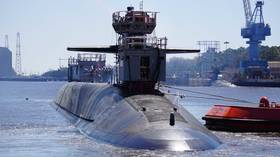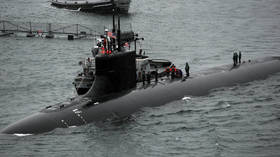Falsified test results for US submarine steel land metallurgist in prison

An American metallurgist who fraudulently altered the results of strength tests on steel used to make US Navy submarine hulls has been sentenced to two-and-a-half years in prison for what a federal judge called “a crime of pride and ego.”
US District Court Judge Benjamin Settle sentenced 67-year-old Elaine Thomas on Monday in Tacoma, Washington, noting that even after an exhaustive navy investigation, “we don’t know the full ramifications of this fraud.” Prosecutor Nick Brown said Thomas had betrayed the navy’s trust for 32 years, “knowingly placing its sailors and military operations at risk.”
Thomas, formerly a lab director for military steel supplier Bradken Inc., was accused of allowing inferior steel to be used on navy subs on half the orders she reviewed. She reportedly told investigators that she believed a test in which steel was cooled to minus 100 degrees Fahrenheit and struck with a pendulum was “stupid” because subs don’t operate in such temperatures. She allegedly falsified about 240 tests, altering failing scores to passing, over a period of more than three decades.
Settle called the case “baffling,” saying, “It seems this was a crime of pride and ego, that in some way she knew better than those who set the standards.”
A lawyer for the metallurgist argued that she’s “a good person who let a number of work pressures cause her to make bad decisions.” Those pressures included sexism in a male-dominated work environment, said the lawyer, John Carpenter. Thomas was reportedly the first woman to earn a metallurgy degree from Washington State University and won a prestigious industry award.
Her falsification of test results first came to light in 2017, and the navy incurred $14 million in costs to examine whether its submarine hulls were safe. Additional monitoring of the 30 hulls with steel tested by Thomas will be required indefinitely.
Bradken fired Thomas after discovering the false test results. It also notified investigators of testing discrepancies, but the defense contractor failed to immediately disclose that the falsified data stemmed from fraud. The company reached a civil settlement with the federal government, agreeing to pay $10.9 million.
Submarine steel is required to meet exacting standards to ensure that hulls hold up in extreme conditions and “wartime scenarios,” prosecutors said. Subs also face risks of collisions, such as when the USS 'Connecticut' struck an undersea mountain in the South China Sea last October, injuring 12 crew members. A similar incident occurred in 2005, killing one sailor and leaving most of the other 136 crew members injured.













